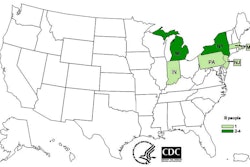
Craig Barber, chairman of the Denny's Franchisee Association, an independent group that is owned and operated by Denny's franchisees to represent their interests, recently explained to Blue MauMau, an online new source for franchise owners, how Denny's franchisees manage the oversight of their supply chain.
By way of background prior to getting into the interview with Barber, franchisees and their groups have been known to go to battle with franchisors in order to be in control of purchasing, distribution and the entire supply chain for a brand. That's because the promise of lower costs through economies of scale of a restaurant chain can be circumvented by a greedy franchisor that can easily benefit from large, hidden kickbacks from vendors. If a franchisor manages the supply chain, its kickbacks typically do not need to be reported to franchisees.
So how do franchisees control national food purchasing to take away the natural temptation of hidden kickbacks to a franchisor? Through the years franchisees have—with typically strong resistance from franchisors—come up with answers.
For example, Subway franchisees created an Independent Purchasing Cooperative, a franchisee-owned supply management company that directs and is liable for the chain's purchasing and logistics for some 30,000 franchisees. Lately it has added information technology infrastructure services for the chain.
Burger King franchisees created their supply chain cooperative in 1991 with their Restaurant Services Inc. company.
In 2009 competitor IHOP created a franchisee purchasing cooperative, The Centralized Supply Chain Services LLC. In the 2014 annual report of DineEquity, the parent company of IHOP, CEO Julia Stewart touted the franchisee-owned cooperative to shareholders, saying the franchisee-owned and operated company "has enabled our franchisees to realize approximately $215 million in total net savings and cost avoidance since its inception in 2009."
Denny's chairman speaks about their solution to the supply management question. While IHOP franchisees have their own company to control national purchasing, Denny's, with its 1,599 franchises in the United States, has advisory councils, which offer advice from franchisee delegates to a willing-to-listen franchisor. However, in addition to advisory councils that most other franchise systems also have, Denny's franchisees have a Supply Chain Oversight Committee (SCOC). It is being funded for a time by the franchisor so it is not a franchisee-owned cooperative. Nonetheless Denny's franchisees have a six to one seat over their franchisor in directing purchasing and logistics.
BMM: Do Denny's restaurant owner-operators own a national cooperative of any kind – e.g. advertising, purchasing, technology?
Barber: The Denny's brand does not own a national cooperative. We had some consideration of that approach but chose a different direction.
We have a Supply Chain Oversight Committee that was developed through the joint cooperation of the DFA and Denny's Inc. in an effort to address the rising cost of goods and equipment to the system, as well as a desire to provide franchisees more input into the procurement and supply chain process. In addition, as part of a broad range of considerations, Denny's Inc. would fund the SCOC for seven years.
The SCOC's role is to oversee and coordinate through Denny's Inc. purchases of food, goods and supplies from manufacturers and suppliers for sale to Denny's franchisees (and Denny's corporate-owned stores) and the distributor who supplies Denny's stores. Franchisees sign an FPA [franchise purchasing agreement] and designate the SCOC as its purchasing agent and agree to abide by and fulfill the purchase commitments made by the SCOC on franchisees behalf.
As the agent for each member, the SCOC works to obtain the lowest possible prices by making or arranging volume purchase commitments and by assuming other purchasing functions and risks on behalf of SCOC member franchisees and Denny's corporate stores. As the purchasing agent, the SCOC will arrange purchases on each member's behalf. However, the members remain liable to each vendor and/or distributor to pay for the purchases arranged by the SCOC. As a disclosed agent, the SCOC is not liable for the purchases. SCOC volume purchase commitments allow suppliers to reduce their costs since they can more effectively plan their production, purchasing and inventory levels, and this savings is passed on to SCOC members.
In addition the SCOC provides oversight, review and collaboration with Denny's Inc. in the coordination of logistics and freight, the negotiation and ongoing monitoring of distribution arrangements, and other supply chain functions including cooperation with Denny's brand management function. The SCOC also provides oversight, review and endorsement of the terms of renewal or replacement to the current MBM distribution agreement.
It is a unique approach that avoids unnecessary administrative costs normally associated with cooperatives while allowing franchisees substantive input to supply chain management. As a point of reference, the SCOC has seven members with six being franchisees appointed by the DFA Board and the other member being Denny's head of procurement.
I hope this helps address your question. I would be remiss not to mention that, in addition to the SCOC, the Denny's brand has three brand advisory councils focused around operations, marketing and development comprised of corporate and franchisee leadership. Their focus is in collaboration, alignment and healthy discourse for their respective areas of discipline. They have been in place since 2011 and are part of the "secret sauce."
The engagement and interaction within our brand is truly unique which is a big part of our success.

















